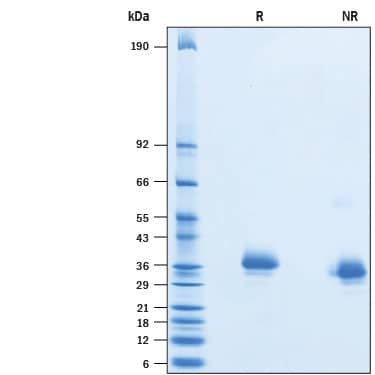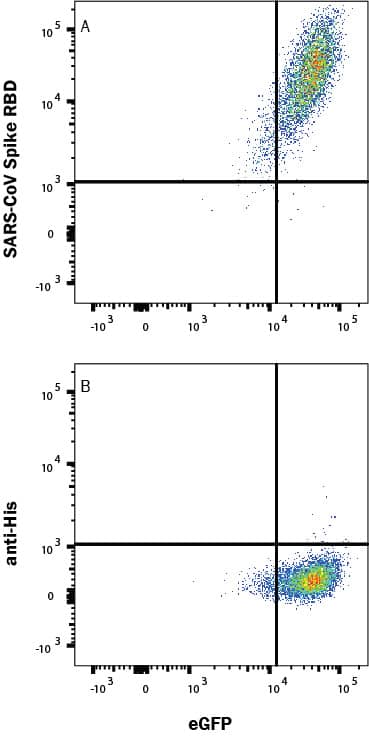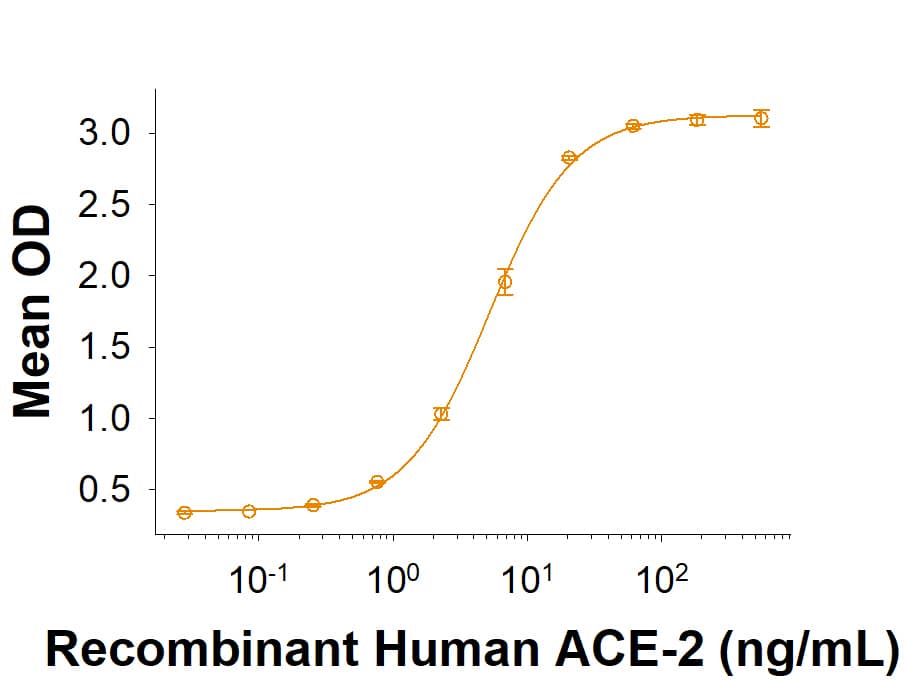Recombinant SARS-CoV Spike RBD His-tag Protein, CF
R&D Systems, part of Bio-Techne | Catalog # 10583-CV
HEK293 Expressed

Key Product Details
Product Specifications
Source
Human embryonic kidney cell, HEK293-derived sars-cov Spike RBD protein
Arg306-Phe527, with a C-terminal 6-His tag
Arg306-Phe527, with a C-terminal 6-His tag
Purity
>95%, by SDS-PAGE visualized with Silver Staining and quantitative densitometry by Coomassie® Blue Staining.
Endotoxin Level
<0.10 EU per 1 μg of the protein by the LAL method.
N-terminal Sequence Analysis
Arg306
Predicted Molecular Mass
26 kDa
SDS-PAGE
32-38 kDa, under reducing conditions
Activity
Measured by its binding ability in a functional ELISA with Recombinant
Human ACE-2 His-tag (Catalog # 933-ZN).
Reviewed Applications
Read 1 review rated 5 using 10583-CV in the following applications:
Scientific Data Images for Recombinant SARS-CoV Spike RBD His-tag Protein, CF
Recombinant SARS-CoV Spike RBD His-tag Protein Bioactivity
Recombinant SARS-CoV Spike RBD His-tag (Catalog # 10583-CV) binds Recombinant Human ACE-2 His-tag (933-ZN) in a functional ELISA.Recombinant SARS-CoV Spike RBD His-tag Protein SDS-PAGE
2 μg/lane of Recombinant SARS-CoV Spike RBD His-tag Protein (Catalog # 10583-CV) was resolved with SDS-PAGE under reducing (R) and non-reducing (NR) conditions and visualized by Coomassie® Blue staining, showing bands at 32-38 kDa.Detection of SARS-CoV Spike RBD Protein bound to ACE-2 expressing cells by flow cytometry.
In a functional flow cytometry test, (A) Recombinant SARS-CoV Spike RBD His-tag Protein (Catalog # 10583-CV) binds to HEK293 human embryonic kidney cell line transfected with recombinant human ACE-2 and EGFP. Ligand binding was detected by staining cells with APC-conjugated anti-His Monoclonal Antibody (IC050A), which does not stain the cells in the absence of recombinant protein (B).Formulation, Preparation and Storage
10583-CV
| Formulation | Lyophilized from a 0.2 μm filtered solution in PBS with Trehalose. |
| Reconstitution | Reconstitute at 500 μg/mL in PBS. |
| Shipping | The product is shipped at ambient temperature. Upon receipt, store it immediately at the temperature recommended below. |
| Stability & Storage | Use a manual defrost freezer and avoid repeated freeze-thaw cycles.
|
Background: Spike RBD
References
- Rota, P.A. et al. (2003) Science 300:1394.
- Bosch, B.J. et al. (2003). J. Virol. 77:8801.
- Belouzard, S. et al. (2009) Proc. Natl. Acad. Sci. USA 106:5871.
- Millet, J.K. and G. R. Whittaker (2015) Virus Res. 202:120.
- Li, W. et al. (2003) Nature 426:450.
- Wong, S.K. et al. (2004) J. Biol. Chem. 279:3197.
- Ortega, J.T. et al. (2020) EXCLI J. 19:410.
- Du, L. el al. (2009) Nat. Rev. Microbiol. 7:226.
Long Name
Spike Receptor Binding Domain
Gene Symbol
S
UniProt
Additional Spike RBD Products
Product Documents for Recombinant SARS-CoV Spike RBD His-tag Protein, CF
Product Specific Notices for Recombinant SARS-CoV Spike RBD His-tag Protein, CF
For research use only
